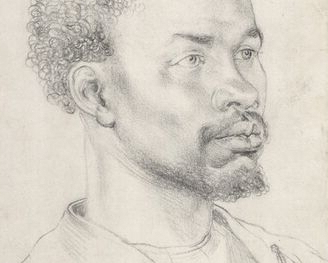What characterized Black experiences in early modern German-speaking Europe was its diverse nature. People of African descent served in courts as musicians, servants, and confidants, and they entered the Church as priests and nuns. One extraordinary philosopher, Anton Wilhelm Amo, made a name in academia. At the same time, however, the birth of the transatlantic slave trade meant that the status of Black people in Europe was shifting downward. Although German courts played a minor role in the slave trade, as these documents here tell us, they nonetheless established their own slave trading companies and assisted other nations in the creation of the Middle Passage. In this context images of Black people began to take on more demeaning features.
We are regularly developing new content. If you see an entry below without a link, that just means we working on the material, and we will make the page live when it is complete. If you would like information on these topics ahead of time, just email us and we’ll be happy to provide what we have ready.
LIFE AT COURT
-
 The Black music theorist and composer Vicente Lusitano in Stuttgart (1560s)
The Black music theorist and composer Vicente Lusitano in Stuttgart (1560s) -
 Dressing up as Moors at court (1609)
Dressing up as Moors at court (1609) -
 The timpanist Christian Ferdinand (1666)
The timpanist Christian Ferdinand (1666) -
 Black attendants of the Great Elector (1690)
Black attendants of the Great Elector (1690) -
 A baptismal gift from the sovereign (1705)
A baptismal gift from the sovereign (1705) -
 Baptismal records
Baptismal records -
 King Frederick I’s smoking party (1709-1710)
King Frederick I’s smoking party (1709-1710) -
 Antoine Pesne, Wilhelmina and her brother Frederick (ca. 1715)
Antoine Pesne, Wilhelmina and her brother Frederick (ca. 1715) -
 Antoine Pesne, Portrait of Friedrich Ludwig and Henriette Marie (ca. 1716)
Antoine Pesne, Portrait of Friedrich Ludwig and Henriette Marie (ca. 1716) -
 An inheritance for Christine Charlotte
An inheritance for Christine Charlotte -
 Traces of a man named Anthon (1731-1733)
Traces of a man named Anthon (1731-1733) -
 Knobelsdorff, Frederick the II as crown price (ca. 1735)
Knobelsdorff, Frederick the II as crown price (ca. 1735) -
 Traces of a woman named Cima
Traces of a woman named Cima
ANTON WILHELM AMO
-
 Anton Wilhelm Amo (ca. 1703-59)
Anton Wilhelm Amo (ca. 1703-59) -
 Anton Wilhelm Amo argues against the legality of slavery in Europe (1729)
Anton Wilhelm Amo argues against the legality of slavery in Europe (1729) -
 Two recommendations for Anton Wilhelm Amo (1733 and 1734)
Two recommendations for Anton Wilhelm Amo (1733 and 1734) -
 Anton Wilhelm Amo is defamed (1747)
Anton Wilhelm Amo is defamed (1747)
TRAVEL AND TRADE, SCIENCE AND SLAVERY
-
 A German knighted in Portugal for an African voyage (1503)
A German knighted in Portugal for an African voyage (1503) -
 Albrecht Dürer’s sketches (1508, 1521)
Albrecht Dürer’s sketches (1508, 1521) -
 Balthasar Springer describes “the land of the moors” (1509)
Balthasar Springer describes “the land of the moors” (1509) -
 Balthasar Springer pillages East African cities (1509)
Balthasar Springer pillages East African cities (1509) -
 An ethnographic view of Guinea (1509)
An ethnographic view of Guinea (1509) -
 Johann Schöner’s globes (1515, 1520)
Johann Schöner’s globes (1515, 1520) -
 Caspar van Senden schemes to take “Blackamoores” from England (1596-1601)
Caspar van Senden schemes to take “Blackamoores” from England (1596-1601) -
 Cannibals and Amazons in the Congo (1598)
Cannibals and Amazons in the Congo (1598) -
 Founding a slave-trading colony in West Africa (1682-1683)
Founding a slave-trading colony in West Africa (1682-1683) -
 Brandenburg slaver Otto Friedrich von der Groeben shares his visit to Guinea (1694)
Brandenburg slaver Otto Friedrich von der Groeben shares his visit to Guinea (1694) -
 A slave trader depicts Africans (1694)
A slave trader depicts Africans (1694)
BLACK SAINTLY FIGURES
-
 Albrecht Dürer, Adoration of the Magi (1504)
Albrecht Dürer, Adoration of the Magi (1504) -
 Fragment of a Retable: St. Maurice (1517)
Fragment of a Retable: St. Maurice (1517) -
 The meeting of Saints Erasmus and Maurice (c. 1520-24)
The meeting of Saints Erasmus and Maurice (c. 1520-24) -
 St. Maurice in the Calenberg Altarpiece (ca. 1500-24)
St. Maurice in the Calenberg Altarpiece (ca. 1500-24) -
 Lucas Cranach the Elder, St. Maurice (ca. 1520-25)
Lucas Cranach the Elder, St. Maurice (ca. 1520-25) -
 Gregory the Moor (ca. 1350-1683)
Gregory the Moor (ca. 1350-1683)

I don’t know how reliable this Wikipedia entry is, but it does mention a Moorish soldier active in Germany in 1586. https://en.wikipedia.org/wiki/Junkersdorf_massacre
LikeLike
Thanks very much for this, which I knew nothing about until you mentioned it. It certainly is an important addition to our understanding of how “Hofmohren” felt about being in the courts, and I’m going to see if I can track down more information about Etnst’s court. If you happen to know more, do please let me know, and thanks again!
LikeLike
Not sure if my comment went through (the page reset itself without telling me either way) but the Wikipedia page on the Junkersdorf massacre of 1586 mentions a Moor serving in the War of Cologne.
LikeLike